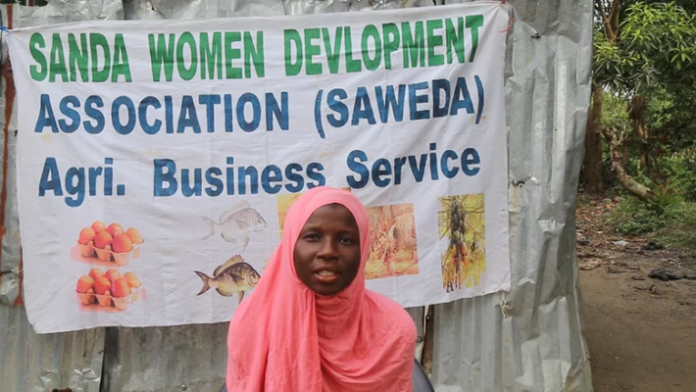
The Smallholder Commercialisation and Agribusiness Development Project (SCADeP) from Sierra Leone has helped beneficiaries improve household incomes, asset ownership and food security with over 54 000 women targeted.
The project has become a success thanks to financial grant support from the World Bank.
“Our families have enough food to eat. We manage our farms and breed poultry to serve both subsistence and commercial purposes. This is what happens when a group of determined women come together to champion their development and help improve the welfare of other women in the Jeoma Falaba community,” said 52-year-old Kadiatu Kamara, chief executive of Sanda Women Development Association (SWDA), a farmer-based group in Sierra Leone’s second-largest city of Bo.
The group started as a ‘savings club’ in 2014, providing micro-credits to its members. In 2018, it transformed into an agribusiness enterprise, focusing on poultry, fish farming, vegetable production, and livestock.
The group supports other business initiatives that generate additional income for its core members – more than 50 women – as well as employ other women and young men who help with poultry and vegetable farming.
Sanda Women is a beneficiary of a $30,000 grant support from the Smallholder Commercialization and Agribusiness Development Project (SCADeP), a program by the Government of Sierra Leone financed by the World Bank. The program promotes smallholder commercialization by fostering productive business linkages between smallholder farmers and agribusiness firms, and other commodity buyers.
“With the hammer mill, labor time to process the animal feed has reduced considerably,” said Kadiatu, pointing to a machine procured through grant funding, which has helped the group to transition from hand-pounding of feed inputs (including oyster shells) with locally-made wooden mortars and pestles.
“The number of poultry birds has increased from 1,000 before SCADeP’s intervention to 10,000 (8,000 layers and 2,000 broilers). The group’s business operations have transformed, and its productivity scaled up.
“We sell hundreds of bags of poultry wastes each month to vegetable farmers in Bo and other towns. We used some of the sales proceeds to start the animal ranch, construct the fishponds populated with tilapia, and support vegetable and rice farming,” Khadija Musa, vice chairlady and marketing officer of SWDA.
The group has improved record-keeping and holds monthly meetings to update its members and plan new initiatives. This knowledge was gained from the Business Development – Technical Assistance supported by SCADeP. It operates an out-grower-scheme of 25 maize farmers groups that have off-taker arrangements with big restaurants in Bo to supply eggs, broilers, and spent layers.
The group has diversified its operations, adding fishponds and a small livestock ranch of 25 animals (13 cows and 12 goats). “We sell hundreds of bags of poultry wastes each month to vegetable farmers in Bo and other towns,” said Khadija Musa, Vice Chairlady and Marketing Officer of SWDA. “We used some of the sales proceeds to start the animal ranch, construct the fishponds populated with tilapia, and support vegetable and rice farming.”
Part of the group’s benefit-sharing scheme is the provision of education support to members’ children. Over a hundred children have gained primary, secondary, and university education through this scheme.
The Sanda Women are currently transitioning from a producer organisation to a company. The Sanda Women Company Limited will be able to leverage private capital from commercial banks to move their operations to scale.
“We want to move to modern technology like the battery cage system wherein once the eggs are laid, the fowls will have no contact with them. This yields high returns and will also preserve the health of the birds,” said Khadija. “But we can only achieve this through a serious investment of capital. We hope to be able to secure financing from banks to grow our business.”
The World Bank said Sanda Women’s success highlights how small-scale grants are contributing to food security and the alleviation of poverty among vulnerable groups, especially women.
Caption: Oya Mariama Kamara, beneficiary of education support through the organization’s profit-sharing scheme.







